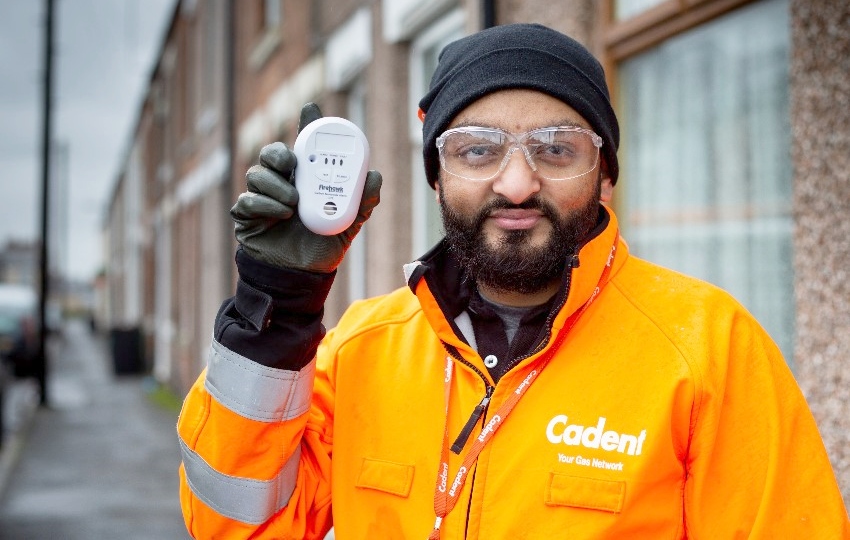Safety advice issued amid rise in Carbon Monoxide cases
Date published: 23 November 2020

Cadent engineer Mo Dawood holding a carbon monoxide alarm
More reported cases of carbon monoxide have come from Greater Manchester than many other areas of the country this year.
During Carbon Monoxide Awareness Week (23 to 29 Nov), gas emergency service Cadent said its engineers attended 3,074 reported incidents in Greater Manchester between January and October.
But this compares to 5,370 in the whole of 2019, which is down 31% when you compare like-for-like, 10-month stats.
This is prompting fears people don’t realise the 24/7 gas emergency service is continuing to operate through regional restrictions and the current lockdown, or that they may even be opting against calling it.
Jenny Moten, North West Network Director, Cadent, said: “Carbon monoxide is known as a silent killer, causing around 40 deaths in England and Wales each year.
“It’s so important that if you suspect its presence – whether that’s a CO alarm activating, or any of the other indicators – you ring us immediately on 0800 111 999.
“The gas emergency service is classed as a critical service, keeping you safe in your home through any Covid-19 regional or national restrictions.
“I want to assure everyone that my engineers are taking extra safety precautions, like washing hands, wearing gloves and masks, and wiping down any surfaces they touch. We remain here for you, 24/7.”
Adding to concerns, a survey of 8,000 people* carried out in August found only 40 per cent nationally had a working, audible CO alarm in their house – 33% in Greater Manchester. Across the country, almost half of home owners (43% in Greater Manchester) admitted they don’t follow the advice to get an annual service from a Gas Safe Registered engineer.
What is Carbon Monoxide and how to reduce the risks
Carbon monoxide occurs through incomplete combustion of fossil fuels. It’s a risk associated with gas boilers and appliances, but also wood-burning fires, barbecues and generators.
You can’t smell, taste or see it – but you can take simple steps to reduce the risks of it emerging.
Go to www.cadentgas.com/co for advice.
Key points are:
Have your gas appliances installed and regularly serviced by an engineer you’ve confirmed is on the Gas Safe Register. These engineers are allowed to continue working in homes through lockdown, with extra safety measures.
Ensure all chimneys and flues are regularly cleaned (annually).
Fit audible carbon monoxide alarms within your home, around three metres from an appliance. Make sure you test these regularly.
Knows the symptoms – which include headache, dizziness, breathlessness, nausea, collapse, loss of consciousness (some people often describe early symptoms as being flu-like, or even being hangover)
Know other warning signs – gas flame appears ‘floppy’ and burns orange or yellow rather than mostly blue, pilot light frequently blows out, or there is soot or yellow-brown staining on or around an appliance.
If you are worried there could be a leak in your property, call the National Gas Emergency Number 0800 111 999, day or night, immediately.
Do you have a story for us? Want to tell us about something going on in and around Oldham? Let us know by emailing news@oldham-chronicle.co.uk , calling our Oldham-based newsroom on 0161 633 2121 , tweeting us @oldhamchronicle or messaging us through our Facebook page. All contact will be treated in confidence.




